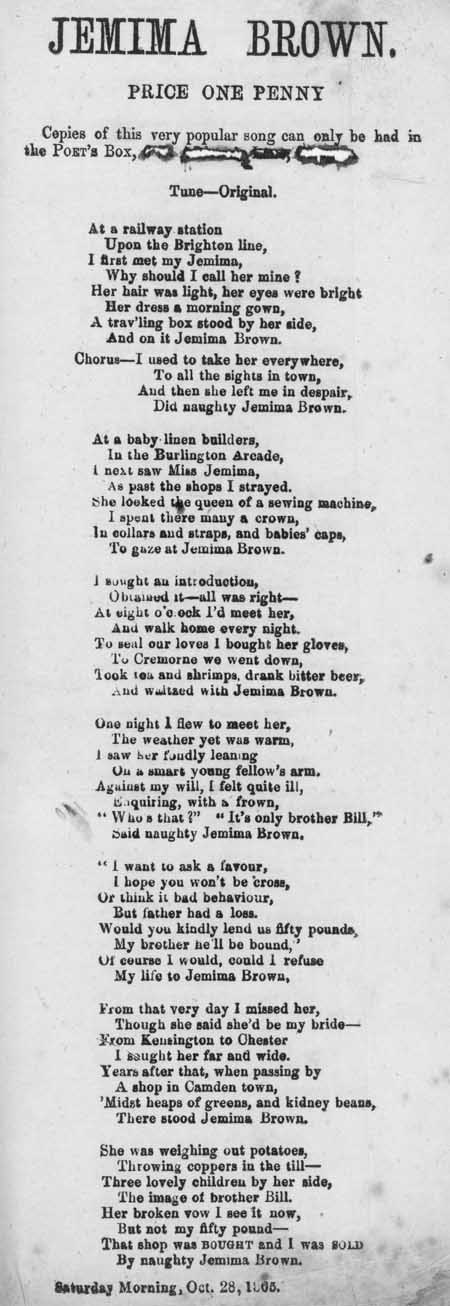Commentary
Verse 1: 'At a railway station, / Upon the Brighton line, / I first met my Jemima, / Why should I call her mine? / Her hair was light, her eyes were bright / Her dress a morning gown, / A trav'ling box stood by her side, / And on it Jemima Brown.' This ballad was to be sung to an 'Original' tune and was priced at one penny. It was published on Saturday, 28th October 1865 by the Poet's Box, probably in Glasgow. One of the most interesting aspects of this ballad is the picture it paints of fashionable society in England in the nineteenth century. Almost all the locations mentioned, including Burlington Arcade, Brighton, Cremorne Gardens and Kensington, are places that became highly popular with the English moneyed classes in the Regency period (1810-1820). The fate of the beautiful embezzler Jemima Brown, running a grocer's shop with her children in Camden Town, seems quite modest in contrast to the description of her early dalliance with the narrator.
The Poet?s Box in Glasgow operated from 1849 to 1911. Matthew Leitch was the proprietor at 6 St. Andrew Lane?s, a narrow street on the south side of Gallowgate, from 1850 to 1858. His son William Munsie Leitch worked at the same address from 1859 to 1865 and at varous addresses in London Street until 1911. Many of the broadsides published by the Glasgow Poet?s Box were dated and some carried advertisements, not just for printed items but also for shoe blacking and ?soap for lovers?! Like the other ?boxes? in Dundee and Edinburgh, the Glasgow one sold love songs, sea shanties, parodies and dialogues. It is not clear what the connection between the different Poet?s Boxes were. They almost certainly sold each other?s sheets. It is known that John Sanderson in Edinburgh often wrote to the Leitches in Glasgow for songs and that later his brother Charles obtained copies of songs from the Dundee Poet?s Box. There was also a Poet?s Box in Belfast from 1846 to 1856 at the address of the printer James Moore, and one in Paisley in the early 1850s owned by William Anderson.
Early ballads were dramatic or humorous narrative songs derived from folk culture that predated printing. Originally perpetuated by word of mouth, many ballads survive because they were recorded on broadsides. Musical notation was rarely printed, as tunes were usually established favourites. The term 'ballad' eventually applied more broadly to any kind of topical or popular verse.
View Transcription | Download PDF Facsimile
|
 |
Date of publication:
1865 shelfmark: L.C.1269(157a)
 View larger image
View larger image
|


